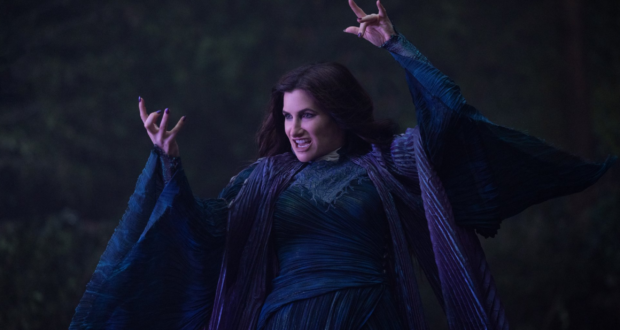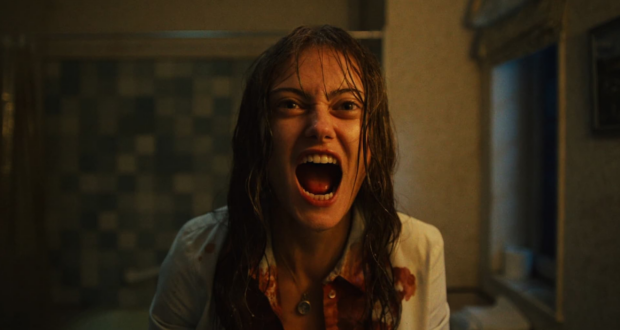Gary Dauberman‘s ‘Salem’s Lot is an engrossing and atmospheric adaptation of Stephen King‘s 1975 novel, successfully transforming the source material into a cinematic experience that feels both classic and contemporary. With a cast led by Lewis Pullman, Makenzie Leigh, Alfre Woodard, and Bill Camp, the film recaptures the eerie, claustrophobic horror of the novel while introducing modern filmmaking techniques that amplify its chilling themes. For fans of supernatural horror, the film strikes a near-perfect balance between slow-burning tension and pulse-pounding moments, with some minor flaws in pacing and narrative focus. Nevertheless, ‘Salem’s Lot proves to be one of the better King adaptations in recent years.
Premise:
The film follows writer Ben Mears (Lewis Pullman), who returns to the small town of Jerusalem’s Lot—colloquially called “Salem’s Lot”—to find inspiration for his next novel. But as he reconnects with his childhood home, he begins to notice that something sinister is lurking beneath the surface of the town. This familiar trope, where a protagonist returns to a haunted or cursed hometown, is given new life through Dauberman’s tight direction, creating a sense of isolation and dread that is palpable throughout the film.
Lewis Pullman is captivating:
Pullman plays Mears with a quiet intensity, capturing the character’s intellectual curiosity and growing paranoia as he uncovers the town’s dark secret: the arrival of a vampire, Kurt Barlow (played with menacing gravitas by Alexander Ward). The gradual discovery of Barlow’s influence on the town is masterfully paced, and the film’s slow reveal of his horrific powers heightens the tension in a way that will please both fans of King’s novel and those unfamiliar with the story.
The ensemble cast is one of the standout elements of ‘Salem’s Lot. Makenzie Leigh delivers a strong performance as Susan Norton, Mears’ love interest, whose warmth and sincerity make her a grounded and relatable character amid the escalating chaos. Leigh’s chemistry with Pullman is convincing, and their relationship provides a necessary emotional anchor to the film’s supernatural elements.
Woodard and Camp shine:
Alfre Woodard, as Dr. Cody, brings gravitas and wisdom to her role, making her one of the key figures in the fight against the vampire threat. John Benjamin Hickey, as Father Callahan, also stands out, portraying the clergyman’s crisis of faith with both vulnerability and strength, particularly as he faces the town’s supernatural invasion. His arc is one of the film’s most compelling subplots, adding layers of existential dread that enhance the overall theme of good versus evil.
Bill Camp’s portrayal of Matthew Burke is a particular highlight. His character, a high school teacher who helps Mears and the other residents confront the vampire, exudes a mix of paternal warmth and weariness. Camp’s performance brings a touch of humanity to the bleak, otherworldly atmosphere of the film, and his moments of dry humor provide a much-needed respite from the horror.
Kurt Barlow:
Ward’s Kurt Barlow is terrifying in his restraint. Rather than overplaying the villainous role, Ward’s portrayal of the ancient vampire is cold, calculating, and deeply unsettling. His piercing eyes and commanding presence make every scene he’s in nerve-racking, creating a chilling antagonist that feels truly evil without descending into campiness.
Atmosphere:
One of Dauberman’s strengths in ‘Salem’s Lot is his ability to craft an atmosphere of slow-building horror. The town itself, with its aging houses, shadowy streets, and decrepit landmarks, feels like a character in its own right. The cinematography by Michael Burgess uses lighting and shadows to great effect, capturing the oppressive atmosphere of the town as it descends into darkness, both literally and figuratively. There are several key sequences in which the use of fog, dim street lamps, and long, empty corridors evoke a haunting, gothic horror that feels timeless.
This atmospheric build-up is complemented by a chilling score from composer Nathan Barr and Lisbeth Scott. His music, subtle yet effective, accentuates the sense of dread without overshadowing the film’s quieter moments. The balance between silence and sound is key to the tension, with the eerie melodies creeping in at just the right moments to ratchet up the suspense.
Pacing:
While the film adheres to the core structure of King’s novel, Dauberman also updates the narrative for modern audiences in ways that feel organic. The pacing, though at times uneven, is generally well-executed, allowing the story’s themes of isolation, fear, and the corruption of innocence to resonate in today’s world. The small-town dynamics and interpersonal relationships are fleshed out in ways that make the horror feel grounded, ensuring that the supernatural elements hit even harder when they arrive.
The first half of the film is slow and methodical, focusing on character development and setting the stage for the eventual descent into chaos. This deliberate pace may feel frustrating to viewers expecting a more action-driven horror film, but for those familiar with King’s brand of slow-burning tension, it’s a rewarding build-up. When the horror finally erupts, it’s visceral and terrifying, with practical effects that enhance the film’s gritty, grounded tone.
Set pieces:
The film’s major set pieces—particularly the climactic battle between the townspeople and Barlow’s minions—are well-staged, with a sense of desperation and raw violence that makes the stakes feel incredibly high. Dauberman doesn’t shy away from bloodshed, but he uses it sparingly, allowing the horror to creep into the audience’s psyche rather than relying on shock value.
Flaws:
While ‘Salem’s Lot is a standout in many respects, it’s not without its flaws. Some characters, particularly those in the supporting cast, feel underdeveloped, and the film’s middle section drags slightly as it transitions from the mystery of Barlow’s influence to the full-on horror of his takeover. A few narrative threads are left unresolved or feel rushed, which may leave some viewers craving more closure.
That said, these issues don’t detract significantly from the overall experience. The film’s strengths—its atmosphere, performances, and ability to evoke genuine terror—far outweigh its minor pacing issues.
Overall:
‘Salem’s Lot is a masterfully crafted horror film that does justice to Stephen King’s beloved novel. With strong performances, a chilling atmosphere, and a well-executed narrative, the film stands as a testament to Dauberman’s understanding of King’s work and his ability to translate it into a visual medium. For fans of supernatural horror and Stephen King adaptations, this is a must-see, delivering scares that linger long after the credits roll.
-
Acting - 9/10
9/10
-
Cinematography/Visual Effects - 9/10
9/10
-
Plot/Screenplay - 8/10
8/10
-
Setting/Theme - 8/10
8/10
-
Watchability - 8.5/10
8.5/10
-
Rewatchability - 7.5/10
7.5/10














